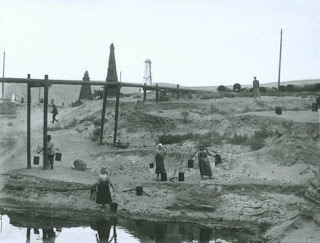 |
| Pipeline, Black City, 1905 |
Sunday, April 10, 2016
Akunin’s Black City
Posted by
Lisa C. Hayden
at
6:24 PM
5
comments
![]()
Labels: Boris Akunin, contemporary fiction, detective novels
Wednesday, June 13, 2012
Guest Post by Olga Bukhina: Having It Both Ways
I was very happy when translator
and writer Olga Bukhina sent me a note last month asking if I’d like her to
write another guest post about Russian literature for children. I was happy to
say Yes: some of you told me you enjoyed her previous guest post, plus I’d been
so busy teaching and working on preparations for Read Russia that I was getting
behind in my own reading and writing. Of course, Olga’s topic sounded great, too—writers
who write for adults and kids—and two of the writers she mentions in her post were
in New York last week for BookExpo America and Read Russia events. I’m grateful
to Olga for writing this post (even more so because I came home exhausted and
with a bad cold)… and for being such a good friend and colleague last week in
New York!
Posted by
Lisa C. Hayden
at
5:30 PM
0
comments
![]()
Labels: Aleksandr Kabakov, Boris Akunin, boris Minaev, children's literature, Dmitrii Bykov, Liudmila Petrushevskaya, Liudmila Ulitskaya
Sunday, May 23, 2010
Two Theater Novels: Bulgakov & Akunin
Reading, Act I: Mikhail Bulgakov’s short, unfinished novel Театральный роман: Записки покойника (known in English by such titles as A Dead Man’s Memoir: A Theatrical Novel and Black Snow: A Theatrical Novel)
Reading, Act II: Boris Akunin’s too-long but too-tidy novel Весь мир театр (literally All the World’s a Theater or All the World’s a Stage)
My reaction: Polite, restrained applause, an indifferent shrug, and a quick exit.
Various versions of A Theatrical Novel on Amazon
Posted by
Lisa C. Hayden
at
5:27 PM
6
comments
![]()
Labels: available in translation(s), Boris Akunin, contemporary fiction, Mikhail Bulgakov, Russian classics
Friday, March 12, 2010
More Mid-March Miscellany: 1 Nomination, 2 Adaptations, 1 Review, 1 Passing & 4 Reading Ideas
Sometimes I go for weeks without seeing any news related to Russian literature, but then there are weeks like this one…
4 Recommendations. Finally, Elif Batuman, author of that other book called The Possessed (previous post), wrote a piece for The Daily Beast (here) recommending four modern classics of Russian literature. They are: Viktor Shklovskii’s ZOO, или Письма не о любви (ZOO, or Letters Not about Love), Andrei Platonov’s Джан (translated by Robert Chander and Olga Meerson as Soul), poet Osip Mandel’shtam’s memoir Шум времени (The Noise of Time), and Today I Wrote Nothing: The Selected Writings of Daniil Kharms.
Dostoevsky's Demons, Devils & Possessed on Amazon
Batuman's The Possessed: Adventures with Russian Books and the People Who Read Them on Amazon
Shklovsky's Zoo, or Letters Not About Love on Amazon
Shvarts's Birdsong on the Seabed on Amazon
Platonov's Soul: And Other Stories on Amazon
Today I Wrote Nothing: The Selected Writings of Daniil Kharms
Posted by
Lisa C. Hayden
at
8:21 PM
8
comments
![]()
Labels: Andrei Platonov, available in translation(s), awards, Boris Akunin, Fyodor Dostoevsky
Monday, November 30, 2009
Notable New Translations: What 2009 Brought
It’s the season for year-end lists so I thought I’d take a look at translations that brought Russian fiction into English translation for the first time in 2009. I always enjoy acknowledging translators and their publishers, and the list is so varied it should provide some fun ideas for personal reading or holiday gifts. I began by looking at the translation database from Three Percent (available here, updated here on 2 December), then added a few items that weren’t on that list…
Life Stories on Amazon
Boris Akunin on Amazon
Do Time Get Time on Amazon
An Awkward Age on Amazon
There Once Lived a Woman... on Amazon
Night Roads on Amazon
The Dacha Husband on Amazon
Memories of the Future on Amazon
A Jewish God in Paris on Amazon
The Stranger (The Labyrinths of Echo) on Amazon
The Golden Calf on Amazon
The Little Golden Calf on Amazon
Posted by
Lisa C. Hayden
at
7:03 PM
0
comments
![]()
Labels: anthologies, available in translation(s), Boris Akunin, contemporary fiction, Il'f and Petrov, literary translation, Russian writers, short stories
Tuesday, September 22, 2009
Red Star and Bunin Prize Finalists
Some unconnected bits of news:

Photo from Jazza, via stock.xchng
Posted by
Lisa C. Hayden
at
2:43 PM
0
comments
![]()
Labels: awards, Boris Akunin, Bunin Prize, Lev Danilkin, Soviet era
Saturday, March 14, 2009
Favorite Russian Writers A to Я: Akunin and Akhmatova
It’s nice that the Russian Cyrillic and Roman alphabets both begin with A… And that the gift of a Boris Akunin book, Любовница смерти (The Lover [fem.] of Death), pushed me to begin reading in Russian again back in 2001.
_cropped.jpg)
Peter Aleshkovsky on Amazon
Chingiz Aitmatov on Amazon
Viktor Astaf'ev on Amazon
Posted by
Lisa C. Hayden
at
5:14 PM
2
comments
![]()
Labels: Anna Akhmatova, Boris Akunin, Chingiz Aitmatov, contemporary fiction, Petr Aleshkovskii, Russian writers, Viktor Astaf'ev



